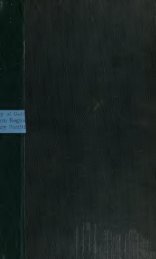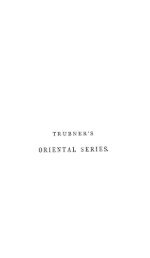Untitled
Untitled
Untitled
You also want an ePaper? Increase the reach of your titles
YUMPU automatically turns print PDFs into web optimized ePapers that Google loves.
'<br />
4<br />
148 )<br />
V<br />
NOTES ON THE FOURTH DISCOURSE<br />
3.<br />
Tkdbif. ibn Qurra of Harran.<br />
T^tiabit ibn Qurra was the chief of another #roup of non-Muslin)<br />
^cholars to whom Arabic science is deeplj indebted. These were the<br />
so-called Sabeans ($dbty of Harran, a town so devoted to Greek (<br />
culture that it was known a3 Hellenopolis. ,Ttae following were the most<br />
notable members of the family :<br />
Qurra<br />
I<br />
Thdbit I (d. Feb. 19, 901 A.D.)<br />
c Ibrahim I Smart<br />
(d.A.H. 331; A.D. 942-3)<br />
Thdbit I r<br />
i<br />
(d.A.H. 363; A.D. 973-4)<br />
(<br />
'<br />
Ibrdhin- II<br />
Ishdq<br />
Thabit ibn Qurra, to whom Qifti devotes a long notice (pp. v 15-122),<br />
was a most prolific writer on logic, arithmetic, geometry, astronomy,<br />
medicine, etc. He* was born at Harran in A.H. 221 (A.D. 836) but spent<br />
most of his life at Baghdad, where he enjoyed the favour of trie Caliph<br />
al-Mu'tadid (A.D. 892-902). Qifti gives a very full and authoritative<br />
list of his writings compiled by Abu 'Ali al-Muhassin 2 ibn Ibrahim ibn<br />
Hilal as-Sabi, including some in Syriac on the Sabean religion and on<br />
music which were never translated into Arabic. The almost miraculous<br />
cure of the butcher related in Anecdote XXXIX of this book is by<br />
Qifti (pp. 120-1) and Ibn Abi Usaybi'a (i, 216) ascribed to Thabit ibn<br />
Qurra. The Dhakhira (^'Thesaurus") mentioned in the text was, according<br />
to Qifti (p. 120), declared by Thabit's homonymous grandson to be<br />
unauthentic, though a good book enjoying a wide circulation.<br />
4. Abu Bakr Muhammad ibn Zakariyyd ar-Rdzi.<br />
1 This famous Persian physician, known to mediaeval Europe as<br />
Bubikir, Abu-beter, Errasis, Rasis and Rhazes, was probably the greatest<br />
3<br />
of the so-called Arabian Medicine who ever lived and as a<br />
,<br />
practitioner<br />
clinical observer far surpassed his later and more celebrated countryman<br />
Avicenna, whose reputation rests more on his philosophical<br />
than orf his<br />
medical attainments, while the contrary holds good of ar-Razi. Indeed<br />
Qifti says (p. 271) that though he devoted a good deal of attention to<br />
Metaphysics he did not understand its ultimate aim, so that' his judgement<br />
was disturbed, and he adopted untenable opinions and objectionable<br />
doctrines. In Medicine, on the other hand, he wa_s inpomparable, and.<br />
1 The true Sabeans of Chaldaea are the of the<br />
Mughtasfla<br />
Arabs, the so-called<br />
writers. The heathens of<br />
"Christians of St John the Baptist" of some European<br />
Harran only adopted this name in the time of al-Ma'mun for a curious /eason fully<br />
explained by Chwolson in his great work Ssabier und Ssabismus (vol. i, ch. vi,,<br />
pp. 139-157).<br />
2 This name, being unpointed, might equally .be read "Muhsin," buU Mirza<br />
Muhammad, in the course of a long note, has pointed out to me that, though common<br />
in later times, Muhsin was in early days a very rare name compared with Muhassin ;<br />
*<br />
statement which he amply substantiates.<br />
3<br />
Compare the enthusiastic but judicious estimate of his talents given by Neuburger<br />
1 68 et seqq.).<br />
,








![La religione di Zarathustra nella storia religiosa dell' Iran [microform]..](https://img.yumpu.com/15970820/1/151x260/la-religione-di-zarathustra-nella-storia-religiosa-dell-iran-microform.jpg?quality=85)


